Executive summary
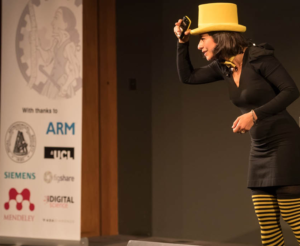
Dr Sara Santos
Ada Lovelace Day is an annual global celebration of women working in science, technology, engineering and maths (STEM), and their achievements. Our ninth year saw us build on the momentum created by the bicentenary of Ada Lovelace’s birth in 2015, and expand the range of resources we offer.
An exciting and hugely successful Ada Lovelace Day Live! was held on 11 October at The Institution of Engineering and Technology, with seven women from across the UK STEM world speaking to a diverse and appreciative audience. And around the world, independent organisers celebrated the day with over 80 events in 55 different towns and cities across six continents.
With the support of Digital Science’s Catalyst Grant, we launched our resources database, providing support to women studying or working in STEM, and organisations, teachers and people interested in gender issues. By making it easier to find information on relevant organisations, funding opportunities, studies, and educational resources, we hope to connect women, teachers and researchers with the information and services that they need to progress their education, careers and projects.
We also created the Ada Lovelace Day Podcast, focused on the achievements, contributions and work of women in STEM, past and present. The podcast has featured a wide variety of engaging series of guests, highlighting some very exciting science, and some important women from the history of STEM.
Our range of merchandise has been expanded, with new ALD t-shirts, stickers for indie event organisers, and careers posters aimed at schools, teachers and youth organisations.
This year, 2017, will see us launch a series of crochet patterns for dolls depicting women in STEM, and we will be releasing a report summarising the current research on the use of role models to inspire girls.
We will continue to maintain and grow our communities and social media engagement, as well as investigate new funding opportunities.
Introduction
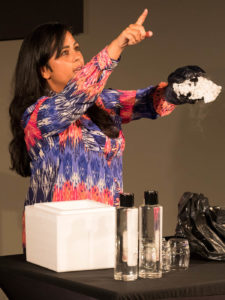
Dr Sheila Kanani
Ada Lovelace Day is an international celebration of the achievements of women in science, technology, engineering and maths (STEM). It aims to increase the profile of women in STEM and, in doing so, create new role models who will encourage more girls into STEM careers and support women already working in STEM.
Founded in 2009 by Suw Charman-Anderson, it is now held every year on the second Tuesday of October. It features our flagship Ada Lovelace Day Live! ‘science cabaret’ event in London, UK, at which women in STEM give short talks about their work or about other women who have inspired them, or perform short comedy or musical interludes with a STEM focus.
Dozens of other events, large and small, organised entirely independently from our main London event, are also held on the day itself and throughout October. These events occur around the world, with at least one on each of the six major inhabited continents.
Ada Lovelace Day also works throughout the year to create materials and services that support girls and women in STEM as well as teachers and parents, and to draw attention to the discoveries, inventions and careers of notable women.
This report will review the work we did in 2016, outline future projects for 2017, examine the challenges we face as we grow our work, organisation and community, and explore the fantastic new opportunities ahead of us.
Why aren’t girls attracted to STEM?
There are many cultural and structural barriers that reduce the number of girls and women who pursue an education or career in STEM. The idea that STEM subjects are “not for girls” is pervasive, even from a very young age.
“Science requires brilliance, and brilliance is male”
A recent study suggests that children consider both genders to possess brilliance (measured by use of the words “really, really smart”) up until the age of six, after which girls, but not boys reject the notion. This belief that brilliance is a male trait persists, even though the same girls recognised that they were achieving higher marks at school than the boys.
“Engineering is difficult, messy and boring”
Research carried out by The IET found that parents of girls were more likely to use negative words like “difficult, messy, boring, dirty” to describe jobs in engineering, and that girls then used these same terms. Parents were much less likely to suggest engineering careers to their daughters and, worse, tended to miss their daughters’ interest in science and engineering, over-assuming interest in other careers.
“Think like scientists”
Research from the OECD showed that girls lack confidence in maths and science, even those who are high-achieving, limiting their future career choices. They found that girls worry that maths is difficult and that they’ll make mistakes, especially when they are asked to “think like scientists” or “formulate situations mathematically”, which makes them reluctant to continue their studies at advanced levels.
We know from experience that one-off interventions are ineffective and that we need to focus on long-term structural and cultural changes. This includes initiatives to challenge stereotypes, provide careers information, and create suitable role models, all with the aim of supporting and encouraging girls and women to achieve their full potential in STEM.
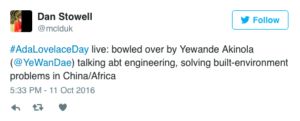
Ada Lovelace Day
We continued to expand the scope and range of Ada Lovelace Day’s activities throughout 2016, but as ever we remain focused on the day itself, which was this year held on 11 October.
Ada Lovelace Day Live!
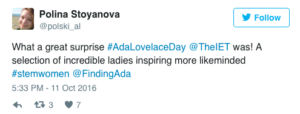 Our annual science cabaret event, Ada Lovelace Day Live!, is unique for focusing solely on women working in STEM and for providing an entertaining backdrop for them to talk about their work. Helen Keen was our compère for the evening, setting the tone for a fun and illuminating night out.
Our annual science cabaret event, Ada Lovelace Day Live!, is unique for focusing solely on women working in STEM and for providing an entertaining backdrop for them to talk about their work. Helen Keen was our compère for the evening, setting the tone for a fun and illuminating night out.
Our speakers were:
- Yewande Akinola, design engineer focused on sustainable water supply systems
- Dr Sheila Kanani, planetary physicist and space comedienne, and education, outreach and diversity officer at the RAS
- Dr Kat Arney, science writer and broadcaster, recently published Herding Hemingway’s Cats
- Dr Sara Santos, maths busker and entertainer, working at corporate events, festivals and schools
- Dr Anna Jones, atmospheric chemist at the British Antarctic Survey, conducting field research in both polar regions
- Jenny Duckett, senior developer at the Government Digital Service, and technical lead for GOV.UK
- Dr Bissan Al-Lazikani, computational biologist for Cancer Research UK, developed world’s largest cancer knowledgebase, canSAR
- Helen Keen, compère, award winning comedy writer and performer, recently published The Science of Game of Thrones
Videos of the talks are available on YouTube, and photos of the evening are on Flickr.
Our event partner for the evening was The IET Women’s Network, who hosted us at their excellent Savoy Place venue. Mendeley sponsored this year’s Ada Lovelace Day Live Scholarships, providing tickets for schools who would not otherwise have been able to attend. Figshare became our media partner to provide a central hub for all Ada Lovelace Day event organisers to share their photos, videos, presentations and other media resources. We also used this space to host our indie event organiser pack and education pack, as well as materials from previous Ada Lovelace Day Live! events.
Working for our audience and our alumnae
Our main focus with Ada Lovelace Day Live! is to inspire and entertain our audience, and 16 year old Aphra Bennett wrote about her experience of ALD Live! and how it helps her combat “silly preconceived notions” of who can and can’t work in STEM.
“Suddenly, you feel like you could be a scientist, an engineer, a technologist, a mathematician,” she wrote. “It feels closer to home. And I cannot express how important it is that for just those couple of hours, sitting there listening to and admiring these aweinspiring women talk about their work fields is enough for girls like me to believe that one day we could be the ones talking on that stage.”
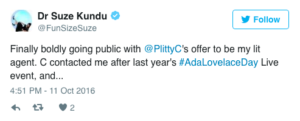
We also work to promote and support our Ada Lovelace Day Live! alumnae, and heard some great news from some of them this year.
Nanochemist Dr Suze Kundu was taken on by Carrie Plitt of the international literary agency, Felicity Brian Agency. She announced her plans to write a book — about nanotech past, present and future — on Twitter, on Ada Lovelace Day.
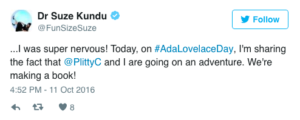
“I really enjoyed the ALD event,” said Dr Sheila Kanani, education outreach and diversity officer at the Royal Astronomical Society. “It was good for my
colleagues to watch me present to such a big audience. I’ve increased my Twitter following and been asked to do some school visits and other talks because of presenting at ALD Live. I have also been approached by a publishers and we are talking about writing a book.”
After her talk at Ada Lovelace Day Live! 2015, Professor Elaine Chew of Queen Mary University of London was invited to the 2016 Sci Foo Camp at the Googleplex in Mountain View, USA, along with other ALD alumnae Dr Suze Kundu and Dr Jen Gupta.
“All three of us attended this un-conference in California,” says Professor Chew. “I wrote about the experience on my blog. For me, being at Sci Foo subsequently led to more invitations, including judging the 2017 Falling Walls Lab Finale in Berlin, and being a plenary speaker at the 2017 The Science of Consciousness conference in Shanghai.”
Engineer Roma Agrawal was amongst several ALD Live alumnae nominated by ALD for the International Visitor Leadership Programme, an annual professional exchange program hosted by the US Department of State. The program offers emerging leaders the opportunity to participate in short-term visits to the US and cultivate relationships with their American counterparts. Agrawal is amongst just 22 women from countries around the world who were accepted onto the 2017 programme.
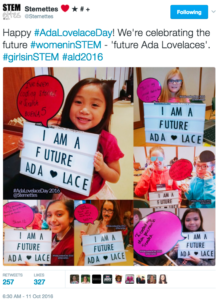
Worldwide events
We have always encouraged groups and individuals to organise their own events to celebrate the day, and 2016 built on the enthusiasm of Ada Lovelace’s bicentenary in 2015.
This year saw the very first events in the Republic of Korea and Ethiopia, with academic talks at a university in South Korea and an all-day workshop for girls to build robots and learn coding in Ethiopia. As well as a lots of events across Europe and the USA, we also had celebrations in Albania, Australia, Brazil, Canada, Nepal, New Zealand, Nigeria, Serbia and Turkey.
Organisers included universities, women in STEM groups, libraries, schools, businesses, festivals and pubs. Between them, they arranged a wide range of exciting activities such as exhibitions and talks, scavenger hunts, cream teas, pub quizzes, coding days, hackathons, bike rides and even a bonfire!
Press coverage
Ada Lovelace Day continues to enjoy considerable press attention, with journalists highlighting the day and writing about different women in STEM. Here is a selection of the coverage we received:
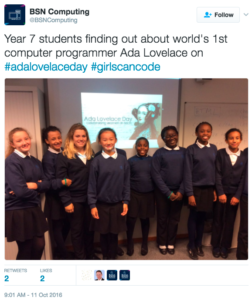
- BBC: What if there were more women in tech?
- The Mirror: Ada Lovelace Day 2016: Who was Ada Lovelace and why is she still a role model for women today?
- Elle UK: 10 Badass Female Scientists Changing The World
- The Guardian: On Ada Lovelace Day, let’s also celebrate 19th-century renaissance woman Agnes Clerke
- Comedy Central: 11 Effing Cool Inventions We Can Thank Women For
- Forbes: Ada Lovelace Day 2016: A Celebration of Women in Science and Technology
- Wired: On Ada Lovelace Day, WIRED highlights the women in STEM changing our world
Resources database
This year marked the soft launch of our resources database, supported by the Catalyst Grant from Digital Science, and sponsors ARM and UCL Engineering. The database includes a wealth of information to women studying or working in STEM, as well as organisations, teachers and people interested in gender issues. By making it easier to find information on relevant organisations, funding opportunities, studies, and educational resources, we hope to connect women, teachers and researchers with the information and services that they need to progress their education, careers and projects.
The data is organised into five main categories:
- Organisations: groups supporting women in STEM
- Funding: grants, scholarships, fellowships and other funding opportunities
- Publication: academic studies and research
- Media: coverage of equality and related issues
- Educational resources: websites, videos and other resources for teachers and parents to help teach STEM and equality
We continue to add regularly to the database, and will be expanding and promoting it further in 2017.
Ada Lovelace Day podcast
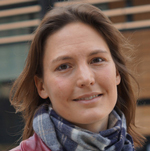
Dr Helen Czerski (photo: University College London)
With the continued and generous support of ARM, we successfully launched our Ada Lovelace Day podcast, focusing on the achievements, contributions and work of women in STEM. With the growing surge in popularity of podcasts, this has been an excellent opportunity to extend our work and promotion of Ada Lovelace Day on a monthly basis.
There are very few podcasts focused on the work of women in STEM, so there’s a clear gap in the market to be filled. We’ve had an enthusiastic reaction to the podcast, from both participants and our audience.
Guests featured on the podcast have included:
- Dr Helen Czerski, physicist and oceanographer at UCL, and author of Storm in a Teacup: The Physics of Everyday Life
- Clive Thompson, technology writer, and author of Smarter Than You Think: How Technology is Changing Our Minds for the Better
- Abbie Hutty, senior spacecraft structures engineer on Airbus’ ExoMars Rover project
- Dr Pete Etchells, senior lecturer in biological psychology at Bath Spa University, and science blog network coordinator for The Guardian
- Roma Agrawal, structural engineer, part of the team who built the Shard
- Professor Haley Gomez, astrophysicist at Cardiff University and recipient of Inspire Wales Award
- Dr Brenna Hassett, bioarchaeologist, founding member of TrowelBlazers collective, author of Built on Bones: 15,000 Years of Urban Life and Death
- Dr Julia Shaw, memory scientist at London South Bank University and author of The Memory Illusion
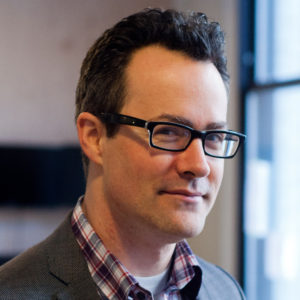
Clive Thompson (photo: Tom Igoe)
They have discussed everything from cosmic dust and biological soft matter, to life on research ships and retrofitting Victorian buildings. Each episode also focuses on an influential woman in STEM such as Ursula Franklin, Chien-Shiung Wu, Professor Anita Gruber, Dame Stephanie “Steve” Shirley and Barbara Mosse, amongst others.
The January 2017 episode also launched a new feature, Discovery of the Month, where we discuss an invention, creation or discovery by a woman, and we held our first competition with a giveaway of Dr Helen Scales’ book, Spirals in Time.
The podcast is available on our website, and via Google Play, iTunes, SoundCloud and Stitcher.
Guest blog posts
This year we have had the privilege of partnering with two of our sponsors, the Royal Astronomical Society and UCL Engineering, for a series of special blog posts.
The RAS were celebrating 100 years of women being elected fellows of the society, and wrote several articles about women who’ve played important roles in the history of astronomy and the RAS. These included Caroline Herschel, the first female astronomer, Margaret Huggins and her work in spectroscopy, Agnes Mary Clerke, for her science writing, Mary Somerville, who was a great polymath and pioneer, and Williamina Fleming and Annie Jump Cannon, two of the Harvard computers.
We are grateful to Michael Hoskin, Barbara Becker, Sara Russell, Allan Chapman and Sue Bowler for their work on these articles.
UCL Engineering computer science student Vicky Dineshchandra also wrote eloquently about the need for university students to inspire school children to take up courses, and potentially careers, in STEM. UCL’s Technological Society ran numerous outreach activities, such as CoderDojos and HackStart, in an effort to encourage enthusiasm in computer science.
Merchandise
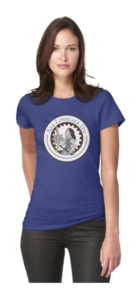 As our notebooks and posters were well received, we decided to increase the range of products offered in our RedBubble store. We had a great deal of success with the Amazingly Enormous STEM Careers Poster, which was developed with thanks to ARM and details the huge range of careers that one can do with different types of degrees. Our Ten Types of Scientist poster, using research from the Science Council, was also made available to purchase from our store. We hope to expand on our career offerings in 2017.
As our notebooks and posters were well received, we decided to increase the range of products offered in our RedBubble store. We had a great deal of success with the Amazingly Enormous STEM Careers Poster, which was developed with thanks to ARM and details the huge range of careers that one can do with different types of degrees. Our Ten Types of Scientist poster, using research from the Science Council, was also made available to purchase from our store. We hope to expand on our career offerings in 2017.
Other new items included relaxed and fitted style T-shirts, in a variety of colours, and some stickers for our indie event organisers. These both featured the ALD roundel, designed by Sydney Padua.
Talks, events and presentations
Beloit College
In January, Suw was invited to Beloit College, in Beloit, Wisconsin, to talk to the computer science students about Ada Lovelace Day and women in technology.
International Women’s Day: Burlington House tour and US Embassy visit
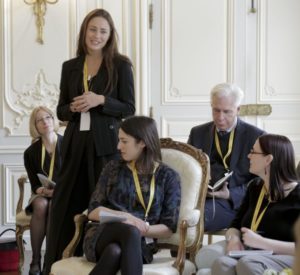
Winfield House Dialogue
Suw spent part of International Women’s Day, 8 March, enjoying a tour of the Burlington House learned societies, including the Royal Astronomical Society who were our Platinum Sponsor. She learnt about the tremendous contributions made by the women 10 of those societies, including the Royal Society of Chemistry, the Geological Society and the Linnaean Society of London.
The next day, she attended a Winfield House Dialogue at the residence of the then American Ambassador Matthew Barzun and his wife Brooke Brown Barzun. A group of mainly women from across industry spent the morning discussing the challenges women face, and how important it is for senior women to champion those who are earlier in their careers. Trowelblazers’ Brenna Hassett attended as Suw’s guest and wrote up her experience on the Trowelblazers blog.
Peterborough STEM festival
At the beginning of October, Digital People in Peterborough (DPiP) organised their very first STEM festival. Suw spent the afternoon speaking to students at the University Centre Peterborough about women in STEM and spoke at the DPiP event that evening.
Ciencia en Redes, Madrid
Suw was invited to give the keynote speech at the Ciencia en Redes conference in Madrid, where she explored the history of ALD, and the importance of social media in community building. She was also interviewed by Agencia SINC (in Spanish) about the challenges faced by women in STEM.
Digital Science
Ada Lovelace Day sponsor Digital Science held a panel event as part of their ALD celebrations, which Suw participated in. The topic was how to champion success and avoid the echo chamber.
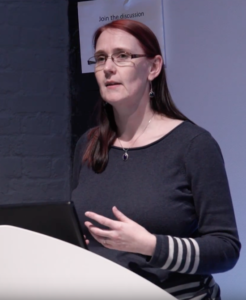 Royal Holloway, University of London
Royal Holloway, University of London
For the second year running, Suw spoke to the computer science students at the Royal Holloway University in Egham about women in technology.
Emmanuel Middle School
Suw also spoke to a very attentive year group at the Emmanuel Middle School in Verwood, Dorset, about potential careers in STEM.
Ignite Sheboygan
Suw closed out the year with a very well-received five minute lightning talk about Ada Lovelace at Ignite Sheboygan in December (video).
Interviews
Tease and Totes featured Suw as their Wednesday Woman, and interviewed her about her childhood, what sparked her interest in tech, how she started Ada Lovelace Day, her inspiration, and the best methods for encouraging girls into STEM fields.
Suw also spoke to Geekgirl, as one of 6 female leaders on how to have your voice heard. She suggested taking the initiative to find opportunities to speak, for instance by contacting conference organisers, and also to gain confidence in public speaking by practicing where performance matters less.
Project Ada interviewed Suw about her reasons for founding Ada Lovelace Day, where she discussed the problems of seeing few women at conferences, why Ada Lovelace was the perfect namesake, and the importance of female role models.
Community
This year we revamped our social media engagement on Facebook, and created a dedicated page for information and news specifically about Ada Lovelace Day. The Ada Lovelace Day Group is now focused on discussing the wider issues facing women in STEM.
We also maintain profiles in many other spaces, including Twitter, where we currently have 8,046 followers; Pinterest, where we are slowly developing our presence and will focus on new, more visual projects, and our very own FindingAda.com community forum.
Our monthly newsletter now has nearly 1,200 subscribers, who receive a mixture of information about Ada Lovelace Day projects and work, women in STEM and diversityrelated articles and other resources that we feel may be of interest to our readers. We hope to continue growing our audience over the coming year.
Governance
At the beginning of 2016, we recruited six Advisors to form a new Advisory Council. These Advisors are:
- Sumaya Abdurrezak, technology industry professional
- Louise Ferguson, user researcher and interaction designer
- Timo Hannay, founder of SchoolDash, an education data analysis firm
- Dr Thorunn Helgason, senior lecturer in ecology at the University of York
- Tom Hunter, director of the Arthur C Clarke Award
- Stefan Magdalinski, technologist and civic activist
The Advisory Council supports Ada Lovelace Day with both strategic and practical advice on governance, fundraising, marketing and community growth.
Projects for 2017
Ada Lovelace Day Live! 2017
Ada Lovelace Day Live! will be held this year on Tuesday 10 October at the Royal Institution of Great Britain in London.
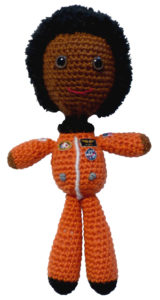 Crochet dolls featuring women in STEM
Crochet dolls featuring women in STEM
We are developing a line of women in STEM crochet patterns in the very popular ‘amigurumi’ style of crochet, which originated in Japan. There are very few patterns for dolls depicting women in STEM available online, and this gap in the market is one we want to fill.
We hope that these dolls will be another way of inspiring girls to pursue their interest in STEM. Our first pattern, astronaut Mae Jemison, is due to be launched shortly, to be followed smartly by Dr Eugenie Clark, The Shark Lady. We hope to release several more this year and, if they are popular, will launch a Kickstarter project to fund a book.
Role models report
At the foundation of Ada Lovelace Day is the idea that role models inspire girls to study STEM and women to pursue a STEM career. Indeed, a lack of female role models has been identified as one factor in the dearth of women in STEM. It is, however, thought that role model relevance varies by age, and that there can be negative effects when the choice of role model is poor.
In order to more fully understand the impact of role models, we have commissioned a literature review to explore the current evidence base. We will provide a summary report to aid schools, businesses, government and campaign groups with their decision making.
We are currently looking for sponsors to support the writing of this report, which will be published later in the year. Please contact Suw Charman-Anderson if you are interested in becoming a sponsor.
Challenges for 2017
As ever, there are challenges that we face as an organisation. Here we identify our key challenges and how we intend to tackle them.
Community and promotion
We have a number of social media profiles with healthy subscriber and engagement numbers, however, we must maintain this momentum and push for further growth. We hope that our crochet patterns will tap into the rising popularity of fibre crafts and will help us to reach new communities, including those who may not be familiar with all we do. We will also continue to grow our Ada Lovelace Day Facebook community group, and encourage some engaging and thoughtful discussion.
Funding
Finding new and sustainable sources of funding is critical to our success, and whilst we are supported by some fantastic businesses and organisations we need to expand our funding so that we can expand our work. Much of our funding is from sponsorship, and we are incredibly grateful for the generous support we receive. It is the sponsors that help us to continue doing our important work. We will be doing outreach to a variety of organisations to promote our projects and highlight sponsorship opportunities.
Thanks to our partners, sponsors, supporters and volunteers
Ada Lovelace Day has become not only a global event, but an organisation that provides year-round support to women in STEM, and this work could not have been achieved without our generous sponsors and partners. We would like to thank our venue partner, The IET, and our sponsors ARM, the Royal Astronomical Society, UCL Engineering, Siemens Rail Automation, figshare, Mendeley, Digital Science, Ada Diamonds and Meromorf Press for their support of Ada Lovelace Day 2016.
If you would like to join this list and become one of our supporters in 2017, then please take a look at the sponsorship prospectus online.
We are also very grateful to our Patreon supporters who, at the end of 2016, were donating a total of $236/£191 per month. We value every penny and hope you will considering becoming a Patreon supporter in 2017.
Last, but definitely not least, our thanks are due to all our volunteers, helpers, speakers and independent event organisers, whose hard work and dedication has made Ada Lovelace Day into a truly worldwide phenomenon that is now an integral part of many people’s calendars. Thanks also to our freelance admin staff and volunteers who have enabled us to expand our work and to help girls and women in STEM all year round.
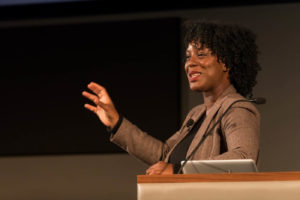
Yewande Akinola